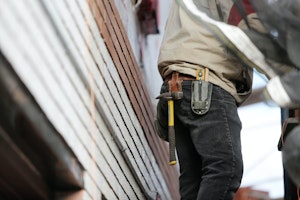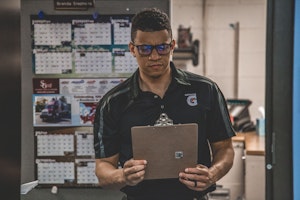

Save, edit or create custom templates like this with Coast.
As a facility manager, preventive maintenance is an important part of keeping your facility functioning as optimally as possible, and entails staying ahead of any potential problems or equipment breakdowns before they occur. Irregular attention to proper facility maintenance can cause mild issues to severe, or life-threatening, security problems down the line. An example of one mild issue might include partial failure of the HVAC system, which could prevent people from doing their daily work.
To avoid such pitfalls, preventive maintenance checklists are a great way to check that all facility operations and areas are functioning as they should. This checklist covers a range of areas around your building that should be examined during a preventive maintenance inspection, including: building exterior, building interior, lighting, and building systems/operations.

Is the glass on your windows in good condition? Check for cracks on all windows from the outside of your building. At least once per year, deep-clean windows and frames with a disinfectant to prevent mold and dirt build-up. Additionally, check condition of doors around your establishment, and ensure they open and close easily as well as lock securely.
This step goes along with keeping a sanitary, attractive establishment. Ensure that the exterior paint and walls of your establishment are in good shape. If paint or walls are peeling or degrading in any areas, take steps to cover or repair as soon as possible, particularly if there are issues with the wall that could worsen over time and cause new problems.
Uneven or severely cracked sidewalks/parking lots could result in lawsuits if neglected. Take care to regularly examine the sidewalk area and parking lots of your property for gullies, holes, and trip-hazard cracks. Repair or fill in immediately.
If you operate an establishment with regularly-used decks or outdoor patios, ensure that such areas are in proper/safe condition for patrons to enjoy. If there are rotting, loose, or broken boards (or railings), fix immediately to prevent accidents from occurring.
Check all storm drains around your facility to ensure grills are free of gunk and operating optimally. Storm drains are designed to collect rainwater runoff, not sewage or hazardous waste, so check drains to make sure no foreign objects are trapped in/around your drains that would impede normal functioning.
While mostly an aesthetic concern, do check outer walls for overgrown vines or any grime that has accumulated in certain areas. If so, remove manually, or with a power washer, if applicable.
If you live in an area where winters are cold to severe, consider having your pipes insulated with foam to significantly reduce the risk of freezing. Thermostats should remain at 55 degrees Fahrenheit or higher to completely combat risk of freezing.
There are few areas around your establishment more important than your roof! On a regular basis, ensure that your roof is in sound condition, and proceed to remove debris from roof drains, examine roof to wall connections for tearing, remove any plant life, and remove standing water on roof after storms.
This action should be performed occasionally, but especially after major storms. If there are large trees around your building, test overhanging branches to ensure they are secure. If not, have them removed immediately to prevent damage.
Check the gates or fences around your establishment to ensure they are secure, and free of rust or splintering. Replace or repaint where needed to reduce risk of injury.

To keep an orderly and attractive establishment, ensure the condition of your walls, floors, and ceilings is at least adequate. If possible, replace tile carpet with new tiles if fraying or tearing occurs. Have wooden floors recoated with protective sealing every 3-5 years. When paint on walls or ceilings begins to fade, or if it is damaged in any area, repaint as needed. Taking these few steps every so often will ensure your facility is properly maintained.
If windows are seldom opened, they can get “stuck” over time, making them prone to breaking if forced open. Frequently open all windows around your establishment to keep them from sticking, and check locks to make sure they are effective, as well.
All faucets, toilets, showers, etc. around your establishment should be functioning properly. Ensure there are no leaks or other glitches that would prevent them from working optimally. Repair any glitches immediately to avoid larger plumbing issues occurring.
Check the interior of your facility for potential hazards, including those as benign as tripping hazards. Reduce any tangle of wires, take steps to correct uneven flooring or carpeting, and be sure that all waste or other hazardous materials are properly disposed of after use.
No matter what kind of material your stairs are made of, they should be sturdy and secure throughout your establishment, no matter what. This includes all railings. Failure to fix any stairwell problems could result in serious accidents or injury for which the proprietor may be held liable.
It’s recommended that you test your fire alarm regularly to ensure proper functioning, which will be crucial in the event of an emergency.
If wall hangings aren’t secured, they can fall easily and cause damage to surrounding items, or result in personal injury. Make sure that all larger wall fixtures are well-secured to prevent accidents from occurring.
Whether “essential equipment” for your facility means kitchenware, cash registers, or forklifts in a warehouse, it’s essential that all essential machinery is up-to-date and working properly.
Check all entrances/exits around the building to be sure that doors can be locked easily and effectively.

Functional exit lighting is absolutely crucial for all staff and patrons of your establishment. Ensure all exit signs are visible, and are illuminated as they should be.
Bulbs should be regularly replaced as they burn out, and should be discarded safely if they contain lead or mercury. Keep a back-up supply of the bulbs you use to replace dead bulbs immediately.
Parking lot lighting, walkway lighting, etc. should always be functioning optimally to reduce the risk of accidents. Replace dead or defective bulbs immediately as they burn out.
Whether indoor or outdoor, lighting is most effective when it is free from obstructions, including dirt and debris. As dirt and dust collect on lighting, clean with an effective solution to ensure that bulbs are effective.
Lead or mercury bulbs can be toxic when broken, so refrain from throwing them in standard trash cans and instead recycle them safely. Your state may require recycling, in fact, so check the EPA website/guidelines for handling such lighting.

Regularly check your fire alarm system to ensure it works effectively, and test sprinkler systems periodically to check that they are functioning as they should.
If you have a general security system, test periodically to ensure it works as it should. Update codes annually to increase building security.
Ensure your HVAC system is in prime condition for circulating clear air throughout your facility. Maintenance includes cleaning, air filter changes, and proper draining of condensate drain pans, to name a few items.
According to OSHA, all elevators in your establishment should be inspected on an annual basis. Post the records of inspection results in a visible place inside your elevator, signed by the inspector who performed the work.
Your fire extinguishers should be checked every six months, and secured well to the wall/case in which it is stored. Replace defective extinguishers immediately for proper fire safety and prevention.
Coast and their collaborators provide this resource as a service to the public. Coast and their collaborators’ are not responsible for, and expressly disclaims all liability for, damages of any kind arising out of use, reference to, or reliance on any information contained within this website.
Please note that this template is provided as an example only. It does not replace your own diligence & research, including workplace, health and safety or other applicable laws. You should seek professional advice to determine if the use of this resource is appropriate or permissible in your workplace or jurisdiction.